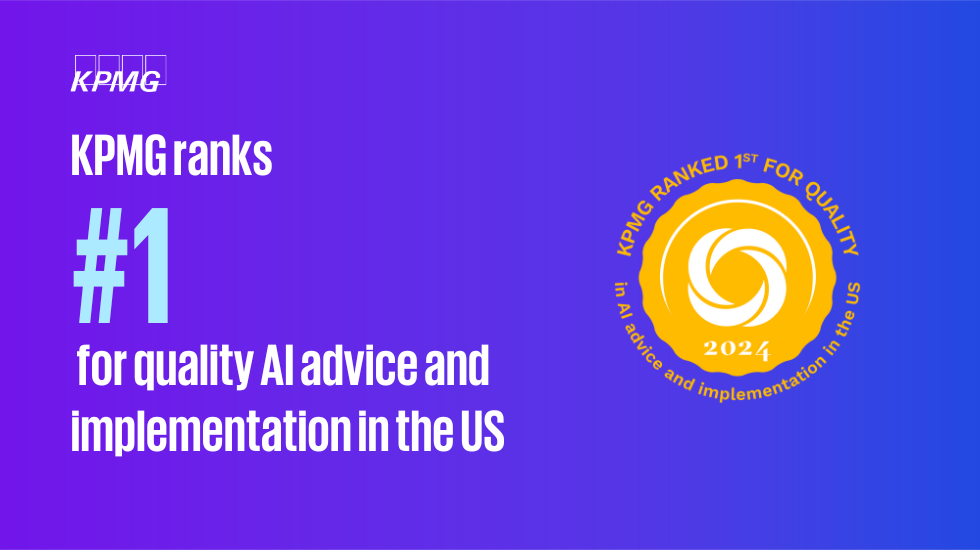KPMG AI Quarterly Pulse Survey
- The majority of respondents feel that AI will fundamentally change the nature of their business over the one-to-two-year horizon (56% in the next year and 67% in the next two years).
- 68% of leaders will invest between $50-$250 million in GenAI over the next 12 months, up from 45% in Q1 of 2024.
- 88% of leaders cite macroeconomic factors as the top factor of concern influencing AI strategies – six months ago, today and six months from now.
- Over half (51%) of organizations are exploring the use of AI agents and another 37% are piloting AI agents. Currently, only 12% of respondents have deployed AI agents for use.
- Chief Information Officers (71%) are increasingly leading AI initiatives, followed by CEOs (17%) and Chief Innovation Officers (10%), a marked shift from earlier in the year when nearly half (49%) reported CEOs as the primary leaders.

NEW YORK, JANUARY 9, 2025 – As macroeconomic pressures, investor demands, and efficiency imperatives mount, business leaders are actively working to align their GenAI ambitions with practical execution, according to the latest KPMG AI Quarterly Pulse Survey.
Most leaders (67%) expect AI to fundamentally transform their businesses within the next two years. However, significant obstacles such as data quality and employee adoption threaten to derail aspirations for transformative, value-driven growth.
“Our latest pulse survey confirms what we’re seeing with clients: organizations are doubling down on AI investments,” said Steve Chase, Vice Chair of AI & Digital Innovation. “The data also shows growing momentum around AI agents, with over half of organizations exploring their use. Leaders are putting real dollars behind agents, but with mounting pressure to demonstrate ROI, getting the value story right is critical.”
2025 is the year of AI agents and scaling AI across the enterprise
2025 brings the opportunity to scale and advance AI capabilities across the enterprise, and a majority of organizations are looking to agentic AI, or tools that can work independently to perform tasks and adapt in real time, to help do so. Over half (51%) of organizations are exploring the use of AI agents today. Leaders expect to utilize the capability for administrative duties (60%), call center tasks (54%) and to develop new business materials (53%) within the next 12 months. Yet, we are still in the early stages of implementation as only 12% are deploying AI agents currently.
"Enterprise technology providers will introduce agentic AI capabilities throughout 2025, enabling organizations to move from experimentation and piloting to broad-scale deployment and integration into existing workstreams," said Todd Lohr, Head of Ecosystems, U.S. Advisory. "The key will be to maintain effective oversight to enhance trust, facilitate employee adoption, and create new opportunities for human-AI collaboration while scaling efficiently."
ROI expectations high but measurement remains elusive amid data and adoption hurdles
Half of leaders are currently scaling their GenAI technology, up from 10% six months ago. However, only a third (31%) of leaders anticipate being able to measure ROI in the next six months, and as of today, none believe they have reached that stage in their GenAI implementation.
“The dynamic nature of AI demands new ways to measure value—beyond the limits of a conventional business case. As leaders work to define the right metrics, those measures must be tightly aligned with the business strategy and should account for the cost of not investing,” Chase continued.
Quality of organizational data is the biggest anticipated challenge to AI strategies in 2025, according to the vast majority of leaders (85%) followed by data privacy and cybersecurity (71%) and employee adoption (46%).
More than 80% are planning to include GenAI as part of their organization’s formal performance development track. Yet just a quarter (24%) of employees are currently leveraging AI embedded into existing workflows at least weekly – an approach that is anticipated to help increase adoption by eliminating the need for employees to proactively access AI tools outside their current ways of working.
Despite consensus on the adoption challenge, companies are investing more in hiring new talent and purchasing technology rather than training their existing workforce. Counter to traditional bottom-up technology adoption patterns, leaders appear to be utilizing GenAI more than middle to entry level employees, suggesting the possibility of underreported usage and governance gaps across the enterprise.
The KPMG Quarterly Pulse Survey captures perspectives from 100 U.S.-based C-suite and business leaders representing organizations with an annual revenue of $1 billion or more. Read additional findings from this quarter below:
- Investor pressure to demonstrate ROI on GenAI investment is important or very important for 68% of leaders.
- Productivity is now the top ROI metric (79%) for the first time since Q1 2024. Profitability is a close second and increased more than any other metric from Q1 to Q4, jumping from 35% to 73%.
- When choosing an AI provider, scalability and performance was considered the most important factor (66%) followed by technology and expertise (61%).
- The quality of organizational data is the biggest anticipated challenge to AI strategies in 2025 (85%), followed by data privacy and cybersecurity (71%), and employee adoption (46%).
- Today, only 7% of organizations have appointed board members with GenAI expertise, although 91% plan to do so.
- The C-suite (71%) and executive management (58%) are using GenAI tools to a greater extent than middle manager (26%) and entry level employees (15%).
- Employee adoption is a top three challenge in 2025, and 81% of leaders are planning on including GenAI in their performance reviews,19% are doing so already.
- 54% of organizations are using GenAI productivity tools at least once a week. Another 24% are using GenAI embedded into existing workflows at least once a week.
About KPMG LLP
KPMG LLP is the U.S. firm of the KPMG global organization of independent professional services firms providing audit, tax and advisory services. The KPMG global organization operates in 142 countries and territories and has more than 275,000 people working in member firms around the world. Each KPMG firm is a legally distinct and separate entity and describes itself as such.
KPMG is widely recognized for being a great place to work and build a career. Our people share a sense of purpose in the work we do, and a strong commitment to community service, inclusion and diversity and eradicating childhood illiteracy. Learn more at www.kpmg.com/us.
Explore more

Generative AI
Reinvent your business with our GenAI solutions. Achieve greater value, drive innovation, and unlock new potential.

KPMG Ranks #1 for Quality in AI Advice and Implementation by Source
According to senior buyers of consulting services who participated in the Source study, Perceptions of Consulting in the US in 2024, KPMG ranked No. 1 for quality in AI advice and implementation services.

KPMG LLP Announces Strategic Investment in Agentic AI Startup Ema
KPMG announced a minority equity investment in Ema, an agentic AI startup building universal AI employees.
